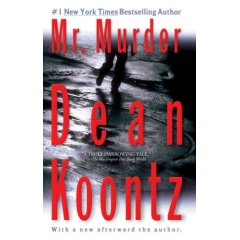Mr. Murder
 Yesterday morning, at a loss to explain why some ill throbbing of insomnia has awakened me, I decided to bide this wakeful time by reading Dean Koontz’s Mr. Murder. Appropriately, after reading a few, select pages I paused to reflect on my own sleeplessness, and I formed at that moment a connection in my own mind with a character’s in the novel that helped me realize something about Dean Koontz’s fiction.
Yesterday morning, at a loss to explain why some ill throbbing of insomnia has awakened me, I decided to bide this wakeful time by reading Dean Koontz’s Mr. Murder. Appropriately, after reading a few, select pages I paused to reflect on my own sleeplessness, and I formed at that moment a connection in my own mind with a character’s in the novel that helped me realize something about Dean Koontz’s fiction. There is some truth, although it is only a kind of bleached truth, to the colorful declaration that once you’ve read one Dean Koontz novel, you’ve pretty much read everything he’s ever written. I’m enjoying Koontz’s Mr. Murder for this very sake, studying the method to his madness: recognizing a disturbing pattern of secret dread aroused in the consciousness of two characters, a mystery novelist, and a programmed killer, from whence unknown.
For a writer accused of being formulaic, Koontz never seems to let his writing style slip into sloppy long-winded sentences, clichés and poor syntax, but is quite tight and subtle, rhetorically. He is the only other writer I know of, aside from Sir Philip Sidney and Shakespeare, who can pull off a firm gradatio:
Though she knows what he wants, she does not know what he needs any more than he does. When he gets what he wants, and when it does not quench the hot need in him, Heather will learn the pattern of emotion that is now so familiar to him: need fosters frustration; frustration grows into anger; anger leads to hatred; hatred generates violence—and violence sometimes soothes. (36)
This degree of sophistication and originality is unexpected of Horror or Thriller writers, but Mr. Murder is, in terms of the evolution of 20th Century Weird Fiction, one of the first meta-fictional novels. Comparing this novel with his earlier breakthrough novel Watchers, I suddenly realize how dangerously easy it is – in this illiterate reader-centric universe of consumer readers - to slip into the fallacy of accusing writers of being formulaic.


1 Comments:
I'm a Koontz fan - but you are absolutely right - if you've read one of his books, you've pretty much read all of them. that's why I love Stephen King so much. He has incredible story telling ability and his books cover such a great range of differing plots.
I guess that's what separates the truly great writers with the mass-produce-type writers.
Post a Comment
<< Home